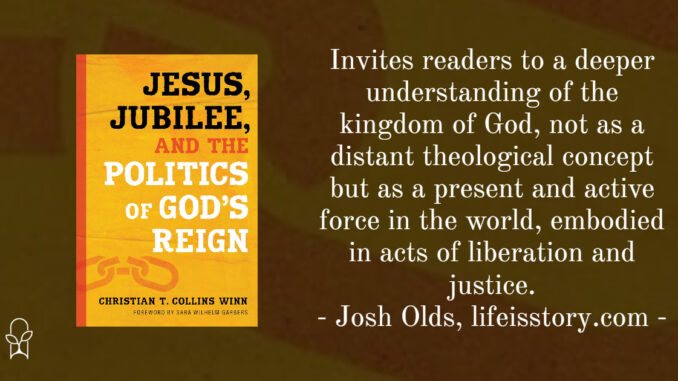
Series: Prophetic Christianity Series
Published by Eerdmans on February 7, 2023
Genres: Academic, Non-Fiction, Theology, Social Justice
Buy on Amazon
Goodreads

In this timely monograph, Christian T. Collins Winn argues that the kingdom of God is Jesus himself. Drawing on a wide breadth of liberation theology, Jesus, Jubilee, and the Politics of God’s Reign amplifies the echoes of salvation history in contemporary struggles for social justice.
Collins Winn demonstrates how the institution of the Jubilee year exemplifies the kingdom of God. A semicentennial celebration prescribed in the book of Leviticus, Jubilee prescribed the redistribution of wealth and freeing of prisoners. Hope for Jubilee persists in apocalyptic rhetoric, from the exhortations of Old Testament prophets to those of modern progressives.Likewise, Jesus’s ministry, passion, and resurrection convey the justice of Jubilee and urgency of apocalypse. His conquest over death represents the ultimate vindication of the oppressed in the kingdom of God, an “outpouring of Spirit” seen today in continuing restorative efforts by oppressed communities in the face of death-dealing institutions. Historically informed and passionately written, Jesus, Jubilee, and the Politics of God’s Reign challenges readers to find Jesus in the marginalized persons of our own time.
I’ve had this book for several months and not written a review of it because I kept waiting to feel like I could write something that could do justice to how transformative this book has been to my perception and expression of social justice. Jesus, Jubilee, and the Politics of God’s Reign is a foundational work of political theology that unveils the structure of the Kingdom of God as resident within the failing empires of men. In no uncertain terms, utilizing the whole corpus of Scripture, Dr. Christian T. Collins Winn builds the case for pursuing biblical social justice as part of being part of God’s Kingdom.
At the end of the introduction to Jesus, Jubilee, and the Politics of God’s Reign, Winn writes:
“Our world, much like the ancient world, continues to be organized by death-dealing powers and ideologies. But God is also at work in our world, working to repair that which is broken, to lift up the lowly, to heal the broken and the brokenhearted, to bring justice and mercy where there is only injustice and despair. The call of discipleship is the call to turn toward the God of life, whose reign is embodied in Jesus. It is the call to receive the Spirit of freedom in the here and now and to enter into the struggle for life for all of humankind and creation, and especially those who have little or no access to the flourishing life that God intends.”
That paragraph, in my opinion, is an effective summary of the book’s message. Jesus, Jubilee, and the Politics of God’s Reign is a manifesto of God’s Kingdom that explains and reveals how this liberative message is the core message of all Scripture. Winn structures the book systematically, beginning with a discussion on “YHWH Has Become King,” setting a theological foundation that is further developed in later chapters. This chapter also recontextualizes the typical view of the “Old Testament” God as vengeful, arguing that God’s justice and righteousness “doesn’t refer to a threatening abstract quality” but “refers to the power of God to make right what has been wrong.” This movement from a God who punishes to obtain justice to a God who restores to obtain justice is a fundamental movement toward a different view of God—toward a God who longs for all creation to flourish.
The chapter “The Hopes of the Prophets” is especially poignant now as I read it again at the beginning of the Advent season. The prophets are so much more than contemporary condemnations and the messianic prophecy. Rather, they are the voices pleading and hoping for a different way of life, one that sees God’s reign characterized by the Jubilee. Winn also explains the concept of Jubilee—a divinely ordained time of economic and social restoration, where debts are forgiven, slaves freed, and land redistributed. This conception of Jubilee is then linked to Jesus’s actions and teachings, suggesting that his ministry offered a tangible expression of this liberative ethos. Winn argues that Jesus’s proclamation of “good news to the poor” and his acts of healing and exorcism are manifestations of the Jubilee, confronting and overturning oppressive systems and structures.
Something that Jesus, Jubilee, and the Politics of God’s Reign does well is that is while it is political, it does not devolve into being partisan—in either secular or religious realms. Winn does not name political parties or Christian denominations that image this Jubilee better or worse and does not tell us who to follow and who to avoid. Rather, he posits that the kingdom of God, exemplified by Jesus, is not synonymous with earthly powers or political projects but is a divine reality that transcends them. Wiin calls for a reexamination of the social and political dimensions of Christian faith, urging believers to engage with contemporary issues of injustice through the lens of Jubilee and the teachings of Jesus.
Jesus, Jubilee, and the Politics of God’s Reign invites readers to a deeper understanding of the kingdom of God, not as a distant theological concept but as a present and active force in the world, embodied in acts of liberation and justice. This book is essential reading for anyone interested in the intersection of faith, social justice, and theological reflection. It has become a foundational part of my own spiritual formation and a work I will treasure forever.
